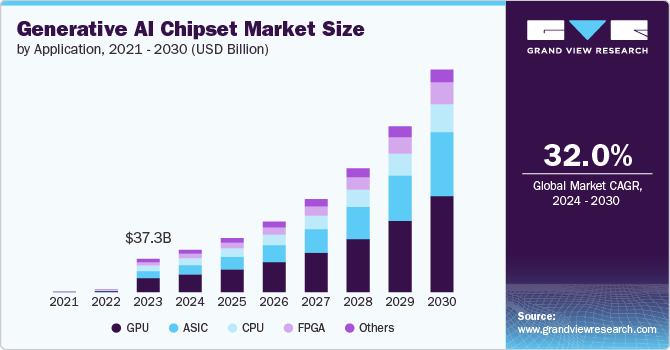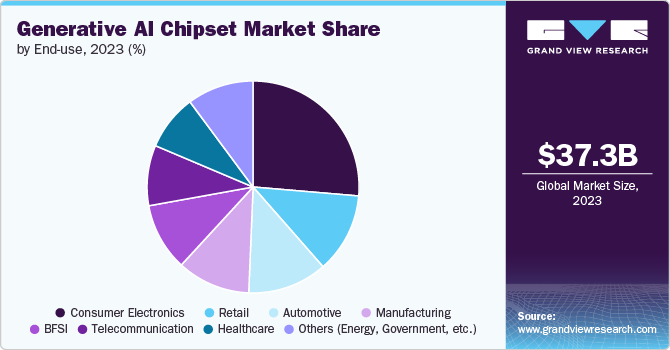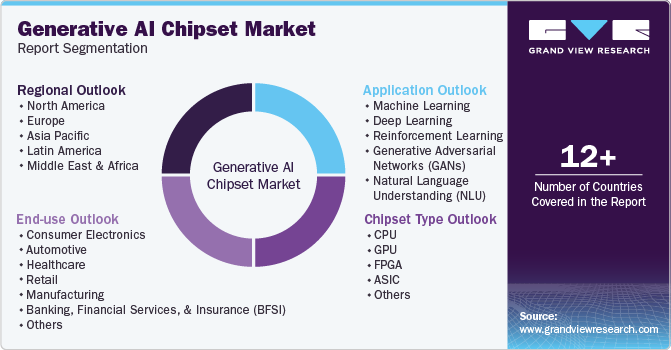
Generative AI Chipset Market Size, Share & Trends Analysis Report By Chipset Type (CPU, GPU, FPGA, ASIC), By Application (Machine Learning, Deep Learning, Reinforcement Learning), By End-use, By Region, And Segment Forecasts, 2024 - 2030
- Report ID: GVR-4-68040-431-3
- Number of Report Pages: 150
- Format: PDF
- Historical Range: 2021 - 2022
- Forecast Period: 2024 - 2030
- Industry: Technology
Generative AI Chipset Market Size & Trends
The global generative AI chipset market size was estimated at USD 37.26 billion in 2023 and is projected to grow at a CAGR of 32.0% from 2024 to 2030. The market is primarily driven by the increasing demand for AI-powered applications across industries, coupled with the need for faster and more efficient AI processing capabilities. The growth of cloud and edge computing is fueling the requirement for AI acceleration in both data centers and edge devices. Advancements in AI algorithms, which are becoming increasingly complex, necessitate more powerful hardware. The need for real-time processing in applications like autonomous vehicles and robotics, along with a focus on energy efficiency, further accelerates the demand for specialized AI chipsets designed to meet these evolving requirements.

The market is witnessing a shift towards specialized AI architectures, with companies developing custom chip designs optimized for specific AI workloads, including generative AI tasks. There's a growing focus on energy efficiency, as developers strive to create chips that can perform AI tasks with lower power consumption. Integration of AI accelerators into broader system-on-chip (SoC) designs is becoming more common. The market is also seeing increased competition between established players and innovative startups, each bringing unique approaches to AI chip design.
Advanced manufacturing processes are being leveraged to improve chip performance, while there's an increased emphasis on building security and privacy features directly into AI chipsets. The rise of domain-specific accelerators, designed for particular AI applications like natural language processing or computer vision, is becoming more prevalent. These trends collectively reflect the market's response to the growing sophistication and diversification of AI applications, particularly in the realm of generative AI.
Another notable trend is the use of AI in designing and optimizing chipsets, leading to more efficient hardware. The market is also seeing increased collaboration among chipset manufacturers, software developers, and AI researchers, fostering innovation and compatibility with modern AI frameworks. Regulatory and ethical considerations are influencing the development of secure and privacy-focused chipsets, while significant investments in R&D continue to drive innovation in next-generation AI chipsets.
Chipset Type Insights
The GPU segment dominates the market, holding the largest share of 41.8% in 2023. GPUs are widely recognized for their ability to handle parallel processing tasks efficiently, making them the preferred choice for running complex AI models, particularly in industries like gaming, entertainment, and autonomous systems. Their flexibility and high computational power make them indispensable in training and deploying generative AI applications. Meanwhile, CPU chipsets also remain essential for managing general-purpose tasks and orchestrating complex AI workloads in combination with other specialized processors.
The ASIC segment is projected to witness the fastest growth during the forecast period from 2024 to 2030. ASICs are designed for specific AI tasks, offering superior performance and energy efficiency compared to general-purpose processors. The rapid growth is driven by the increasing demand for customized AI solutions in sectors such as healthcare, finance, and edge computing, where optimized performance and power efficiency are crucial. Further, FPGA chipsets are also gaining traction due to their reconfigurability, which allows them to be tailored for different AI workloads. This makes them suitable for applications where flexibility and adaptability are essential, such as in research and development environments.
Application Insights
The Deep Learning segment held the largest share of the market in 2023. Deep learning's dominance is driven by its widespread adoption across various industries, including healthcare, finance, and autonomous systems, where it powers complex tasks such as image and speech recognition, natural language processing, and predictive analytics. The computational intensity of deep learning models necessitates the use of high-performance chipsets, contributing to this segment's significant market share. Further, machine learning segment continues to be a key application area, with broad usage in predictive modeling and data analysis across industries.
The Generative Adversarial Networks (GANs) segment is projected to expand with a highest growth rate over the coming years. GANs, known for their ability to generate realistic data, such as images and videos, are increasingly being utilized in creative industries, synthetic data generation, and cybersecurity. The rising demand for innovative and efficient AI solutions in these areas is driving the rapid adoption of chipsets optimized for GANs, fueling robust growth in the segment. The Natural Language Understanding (NLU) segment is also expanding, propelled by the increasing use of AI in conversational agents, virtual assistants, and sentiment analysis, necessitating specialized chipsets that can handle the complexities of human language.
End-use Insights
The market is led by the Consumer Electronics segment, which holds the largest share in 2023. This is primarily driven by the widespread adoption of AI in devices such as smartphones, smart home systems, and wearables. These devices increasingly rely on AI for features like voice assistants, image processing, and personalized recommendations, which necessitate advanced AI chipsets. The growing consumer demand for smarter and more intuitive electronics continues to reinforce the dominance of this segment in the market. Further, retail sector is leveraging AI for customer analytics, inventory management, and personalized shopping experiences, contributing to its steady market share.

The Automotive segment is projected to witness the fastest growth rate during the forecast period from 2024 to 2030. The automotive industry's increasing focus on autonomous driving, advanced driver assistance systems (ADAS), and in-vehicle infotainment systems is driving the demand for high-performance AI chipsets. As automakers invest heavily in AI to enhance vehicle safety, efficiency, and user experience, the adoption of generative AI chipsets in this sector is expected to surge, making it the fastest-growing end-use segment. Additionally, healthcare segment is also experiencing significant growth, driven by the adoption of AI in diagnostics, personalized medicine, and medical imaging. In Manufacturing, AI chipsets are being used to optimize production processes, predictive maintenance, and quality control.
Regional Insight
North America generative AI chipset market accounted to hold dominant share in the market and accounted for a 43.8% share in 2023. The growth is driven by strong investments in AI research and development, particularly in the technology and automotive sectors. The region's established tech ecosystem, with major companies like NVIDIA, Intel, and AMD leading innovations, is fueling demand for advanced AI chipsets. Additionally, North America benefits from early adoption across industries such as healthcare, finance, and retail, where AI is being used to enhance decision-making, customer experience, and operational efficiency. The growing focus on edge computing and AI-driven automation further boosts the market in this region.
U.S. Generative AI Chipset Market Trends
The generative AI chipset market in the U.S. stands at the forefront, being home to several leading AI chipset manufacturers and a hub for cutting-edge AI research. The country’s dominance is bolstered by substantial government and private sector investments in AI and semiconductor technologies. The U.S. market is characterized by rapid adoption in sectors such as defense, healthcare, and automotive, where AI applications are critical for innovation. The presence of tech giants like Google, Microsoft, and Tesla also drives the demand for specialized AI chipsets, especially as these companies push the boundaries of AI capabilities.
Europe Generative AI Chipset Market Trends
Europe generative AI chipset market is witnessing a steady growth, supported by strong regulatory frameworks and government initiatives that promote AI innovation and digital transformation. Countries like Germany, the UK, and France are leading the adoption, particularly in the automotive, manufacturing, and financial services sectors. Europe’s focus on ethical AI and data privacy also influences the development and deployment of AI chipsets, with a growing emphasis on energy-efficient and secure AI solutions. Collaborative efforts between academia, industry, and government are further driving advancements in AI chipset technologies across the region.
Asia Pacific Generative AI Chipset Market Trends
The generative AI chipset market in Asia Pacific is emerging as a major player, driven by rapid industrialization, a growing consumer electronics market, and significant investments in AI by countries like China, Japan, and South Korea. China, in particular, is heavily investing in AI technology to reduce dependency on Western technologies and is fostering a robust domestic semiconductor industry. The region’s strong manufacturing base, coupled with increasing demand for AI in applications like smart cities, autonomous vehicles, and consumer devices, is propelling the growth of the AI chipset market. Additionally, the rise of local tech giants and startups focused on AI innovation is contributing to the region’s expanding market share.
Key Generative AI Chipset Company Insights
Leading companies in the market are making significant strides through cutting-edge innovations and strategic partnerships. NVIDIA Corporation is at the forefront, launching advanced platforms like the HGX H200 and Blackwell, enhancing AI performance with breakthroughs in memory and real-time generative AI capabilities. Companies are also collaborating on AI-based manufacturing solutions, underscoring the growing importance of AI-driven advancements across various sectors. These initiatives reflect a robust investment in AI and computing power, positioning these companies as leaders in the rapidly evolving technology landscape.
For instance, In April 2024, Micron Technology, Inc. and Silvaco Group, Inc. extended their partnership to develop an AI-driven solution called Fab Technology Co-Optimization (FTCO). This solution allows customers to utilize manufacturing data to conduct machine learning software simulations and create a computer model to simulate the wafer fabrication process. Micron Technology invested USD 5 million in developing FTCO.
Key Generative AI Chipset Companies:
The following are the leading companies in the generative AI chipset market. These companies collectively hold the largest market share and dictate industry trends.
- Advanced Micro Devices, Inc.
- Apple Inc.
- Arm Holdings plc
- Broadcom Inc.
- Cerebras Systems
- Google Inc.
- Graphcore
- Intel Corporation
- Micron Technology, Inc.
- Mythic AI
- NVIDIA Corporation
- Qualcomm Technologies, Inc.
- Xilinx Inc.
Recent Developments
-
In July 2024, Northern Data Group (Germany) introduced Europe’s first cloud services powered by NVIDIA’s H200 GPUs. With 2,000 H200 GPUs, the company is poised to deliver an exceptional 32 petaFLOPS of performance. Such significant investments by cloud service providers (CSPs) are expected to drive the growth of the AI chip market during the forecast period.
-
In June 2024, Advanced Micro Devices, Inc. (US) unveiled the AMD Ryzen AI 300 Series processors, which feature powerful NPUs delivering 50 TOPS of AI-processing power for next-generation AI PCs. These processors are powered by the new Zen5 architecture, equipped with 12 high-performance CPU cores, and include advanced AI architecture for enhanced gaming and productivity.
-
In May 2024, Google (US) announced Trillium, its sixth-generation TPU, designed to enhance training and serving times for AI workloads. The Trillium TPU boasts increased clock speed and larger matrix multiply units, powering the next wave of AI models.
-
In March 2024, NVIDIA Corporation (US) introduced the NVIDIA Blackwell platform, enabling organizations to build and operate real-time GenAI systems with six transformative technologies for accelerated computing. The platform supports AI training and real-time large language model (LLM) inference for models with up to 10 trillion parameters.
-
In November 2023, NVIDIA Corporation launched the upgraded HGX H200 platform, built on the Hopper architecture and featuring the H200 Tensor core GPU. This GPU, the first to incorporate HBM3e memory, offers an impressive 141 GB of memory with a blazing speed of 4.8 terabytes per second.
Generative AI Chipset Market Report Scope
|
Report Attribute |
Details |
|
Market size value in 2024 |
USD 47.39 billion |
|
Revenue forecast in 2030 |
USD 250.21 billion |
|
Growth rate |
CAGR of 32.0% from 2024 to 2030 |
|
Base year for estimation |
2023 |
|
Historical data |
2021 - 2022 |
|
Forecast period |
2024 - 2030 |
|
Quantitative units |
Revenue in USD billion, and CAGR from 2024 to 2030 |
|
Report coverage |
Revenue forecast, company ranking, competitive landscape, growth factors, and trends |
|
Segments covered |
Chipset type, application, end-use, region |
|
Regional scope |
North America, Europe, Asia Pacific, Latin America, MEA |
|
Country scope |
U.S., Canada, UK, Germany, France, China, Japan, India, South Korea, Australia, Brazil, Mexico, Kingdom of Saudi Arabia (KSA), UAE, South Africa |
|
Key companies profiled |
Advanced Micro Devices, Inc.; Apple Inc.; Arm Holdings plc; Broadcom Inc.; Cerebras Systems; Google Inc.; Graphcore; Intel Corporation; Micron Technology, Inc.; Mythic AI; NVIDIA Corporation; Qualcomm Technologies, Inc.; Xilinx Inc. |
|
Customization scope |
Free report customization (equivalent up to 8 analysts working days) with purchase. Addition or alteration to country, regional & segment scope. |
|
Pricing and purchase options |
Avail customized purchase options to meet your exact research needs. Explore purchase options |
Global Generative AI Chipset Market Report Segmentation
This report forecasts revenue growth at global, regional, and country levels and provides an analysis of the latest industry trends in each of the sub-segments from 2021 to 2030. For this study, Grand View Research has segmented the global generative AI chipset market report based on chipset type, application, end-use, and region:

-
Chipset Type Outlook (Revenue, USD Billion, 2021 - 2030)
-
CPU
-
GPU
-
FPGA
-
ASIC
-
Others
-
-
Application Outlook (Revenue, USD Billion, 2021 - 2030)
-
Machine Learning
-
Deep Learning
-
Reinforcement Learning
-
Generative Adversarial Networks (GANs)
-
Natural Language Understanding (NLU)
-
-
End-use Outlook (Revenue, USD Billion, 2021 - 2030)
-
Consumer Electronics
-
Automotive
-
Healthcare
-
Retail
-
Manufacturing
-
Banking, Financial Services, and Insurance (BFSI)
-
Telecommunication
-
Others (Energy, Government, etc.)
-
-
Regional Outlook (Revenue, USD Billion, 2021 - 2030)
-
North America
-
U.S.
-
Canada
-
Mexico
-
-
Europe
-
Germany
-
UK
-
France
-
-
Asia Pacific
-
China
-
Japan
-
India
-
South Korea
-
Australia
-
-
Latin America
-
Brazil
-
-
Middle East and Africa (MEA)
-
Kingdom of Saudi Arabia
-
UAE
-
South Africa
-
-
Frequently Asked Questions About This Report
b. The global generative AI chipset market size was estimated at USD 37.26 billion in 2023 and is expected to reach USD 47.39 billion in 2024.
b. The global generative AI chipset market is expected to grow at a compound annual growth rate of 32% from 2024 to 2030 to reach USD 250.21 billion by 2030.
b. North America dominated the generative AI chipset market with a share of 43.8% in 20230. This is attributable to strong investments in AI research and development, particularly in the technology and automotive sectors and region's established tech ecosystem, with major companies like NVIDIA, Intel, and AMD leading innovations
b. Some key players operating in the generative AI chipset market include Advanced Micro Devices, Inc.; Apple Inc.; Arm Holdings plc; Broadcom Inc.; Cerebras Systems; Google Inc.; Graphcore; Intel Corporation; Micron Technology, Inc.; Mythic AI; NVIDIA Corporation; Qualcomm Technologies, Inc.; Xilinx Inc.
b. Key factors that are driving the market growth include the increasing demand for AI-powered applications across industries, growth of cloud and edge computing, and the need for real-time processing in applications like autonomous vehicles and robotics
We are committed towards customer satisfaction, and quality service.
"The quality of research they have done for us has been excellent."




